Ready for Ramadaan?? Millions of Muslims in the street to pray | Alexandria, Egypt
Posted in Daily Islam,EventsJuly 19, 2012No comments
Posted in Daily Islam,EventsJuly 19, 2012No comments
Posted in Daily Islam,QuranJuly 19, 2012No comments
The Qur’an mentions only 25 prophets by name, including Zakariyah(A S), the father of Yahya (John the Baptist). Muslims, believe that many prophets were sent to mankind to spread the message of Allaah, including many not mentioned in the Qur’an.
General Description of Zakariyah (A S)
The years had taken their toll on the Prophet Zakariyah (A S) . He was now old and bent with age, in his nineties. Despite his feebleness, he went to the Mosque daily to deliver his sermons.
Zakariyah (A S) was not a rich man, but he was always ready to help those in need. His one disappointment in life was that he had no children, for his wife was barren. This worried him, for he feared there was no one after him to carry out his work. The people needed a strong leader, for if they were left on their own, they would move away from Allaah’s teachings and change the Holy Laws to suit themselves.
Zakariyah Talks to Maryam (‘Alayha Salaam)
Almighty Allaah chose Prophet Zakariyah (A S) as a prophet to the Children of Israel to guide them to believe in Allaah and worship Him alone. That was after false beliefs had spread amongst them and after they had neglected Allaah’s religion which He revealed to Prophet Moosa (A S) (Moses).
This took place years before the birth of Prophet ‘Eesaa(A S) (Jesus) the son of Maryam (‘Alayha Salaam). At that time, there was a pious man, called ‘Imraan, from the Children of Israel who was famous for his knowledge, piety, and virtue.
‘Imraan had a kind and pious wife. When she felt that she had become pregnant, she vowed that she would dedicate the baby that was in her womb for the service of Almighty Allaah and the service of the sacred mosque in Jerusalem and be totally devoted for this throughout his life. When she delivered her baby, she said, “My Lord! I have delivered a female child, and the male is not like the female. I have named her Maryam (‘Alayha Salaam) (Mary), and I seek refuge with You to guard her and for her offspring from Satan, the outcast.” After that, and when Maryam (‘Alayha Salaam) became a little older, her mother took her to Jerusalem to fulfill her vow.
It was necessary that one of the rabbis from among the pious clergymen who dwelt in the Mosque should care for Maryam (‘Alayha Salaam), in order to bring her up, properly cultivate her and attend to her needs.
The rabbis competed with one another each trying to take Maryam (‘Alayha Salaam) the daughter of the glorious scholar (‘Imraan), under his care. The most ambitious among them was Prophet Zakariyah(A S), who was the husband of her elder sister and the worthiest to take care of and cultivate her.
They agreed to draw lots so as to choose the one who would be the girl’s guardian. As the lot came up in his name, Prophet Zakariyah (A S), was very happy. He designated a special place for her in the mosque that no one but her was allowed to enter and raised her well and took care of her. She used to worship Almighty Allaah and glorify Him day and night so much so that she set an example of piety, goodness, and true deep faith. Moreover, Allaah honored her with special super natural events that indicated how much He privileged her and how high her rank was.
During one of his visits to the Mosque, he went to check on Maryam (‘Alayha Salaam), who was living in a secluded room of the Mosque. He was surprised to find fresh out-of-season fruit in her room. Besides him, no one had entry to her room. When he inquired, she told him that the fruit was from Allaah. She found it every morning. But why was he so surprised, she asked him. Did he not know that Allaah provides without measure for whom He wills?
This noble girl had opened his eyes to a startling idea. Could he not ask his Lord to bless him with a child in his old age? Even if his wife was past child-bearing age, nothing was impossible for his Gracious Lord!
Zakariyah Asks for a Son – Qur’anic
Allaah the Almighty revealed: ‘Kaf, Ha, Ya, Ain, Sad, These letters are one of the miracles of the Qur’an, and none but Allaah (Alone) knows their meanings. (This is) a mention of the Mercy of your Lord to His slave Zechariah. When he called out his Lord (Allaah) – a call in secret, saying: ‘My Lord! Indeed my bones have grown feeble, and grey hair has spread on my head, and I have never been unblest in my in vocation to You, 0 my Lord! And Verily! I fear my relatives after me, since my wife is barren. So give me from Yourself an heir, – who shall inherit me, and inherit (also) the posterity of Jacob (inheritance of the religious knowledge and Prophethood, not the wealth, etc.) And make him, my Lord, one with whom You are Well-pleased!”
(Allaah said): “0 Zakariah! Verily, We give you the glad tidings of a son. His name will be Yahya. We have given that name to none before (him).”
He said: ‘My Lord! How can I have a son, when my wife is barren, and I have reached the extreme old age.”
He said: “So (it will be). Your Lord says, It is easy for Me. Certainly I have created you before, when you had been nothing.”
(Zakariah) said: ‘My Lord! Appoint for me a sign.”
He said: ‘Your sign is that you shall not speak unto mankind for three nights, though having no bodily defect.”
Then he came out to his people from Al-Mihrab (a praying place or a private room, etc.), he told them by signs to glorify Allaah ‘s Praises in the morning and in the afternoon.
(It was said to his son): “0 Yahya! Hold fast to the Scripture (The Torah).” And We gave him wisdom while yet a child, and (made him) sympathetic to men as a mercy (or a grant) from Us, and pure from sins (i.e. Yahya(John)) and he was righteous, and dutiful towards his parents, and he was neither an arrogant nor disobedient (to Allaah or to his parents). And Salamun (peace) on him the day he was born, the day he dies, and the day he will be raised up to life (again)! Surah 19: 1-12
Posted in Daily Islam,QuranJuly 18, 2012No comments
When the earth is shaken with her (violent) shaking,
And the earth brings forth her burdens,
And man says: What has befallen her?
On that day she shall tell her news,
Because your Lord had inspired her.
On that day men shall come forth in sundry bodies that they may be shown their works.
So. he who has done an atom’s weight of good shall see it And he who has done an atom’s weight of evil shall see it. Surah Al-Zilzal (99:1-8)
Posted in Daily Islam,HadithJuly 18, 2012No comments
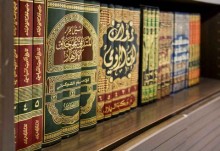
The Prophet sallallaahu `alayhi wa sallam said about Mu`aadh ibn Jabal: “Verily, when the people of knowledge will be present before their Lord, the Mighty and Sublime, Mu`aadh will be one step ahead of them.” [Saheeh, Ibn Sa`d, Aboo Nu`aim, at-Tabaraanee]
Aboo Nu`aim reports some sayings of Mu`aadh himself about the excellence of knowledge, among which we find the following:
“Knowledge is a comforting friend in times of loneliness, it is the best companion during travels, and it is the inner friend who speaks to you in your privacy. Knowledge is the discerning proof of what is right and what is wrong, and it is the positive force that will help you surmount the trials of comfort, as well as those of hardships. Knowledge is your most powerful sword against your enemy, and finally, it is your most dignifying raiment in the company of your close companions.”
“Through knowledge, Allah, blessed be His Name, raises some people in rank, and He makes them leaders in righteousness and models in morality. The vestige of their faith is avidly sought, their deeds are emulated perceptively, and people will seek and sanction their opinions solicitously and unequivocally. The heavenly angels seek their company and anoint them with their wings, every fresh or withered life they pass by implore Almighty Allah to forgive them their sins, even the fish in the oceans, the beasts of the lands and every bird of prey and migratory bird pray and solicit the mercy of Almighty Allah on their behalf. This is because knowledge revives the dead hearts and drives them out of darkness into light, and because knowledge is the light of the inner eyes that cures one’s blindness and restores his inner sight.”
Posted in Daily IslamJuly 18, 2012No comments
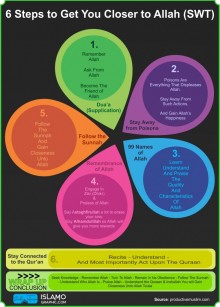
Posted in Daily Islam,HadithJuly 17, 2012No comments
A man asked the Prophet (sallallähu alaihi wasallam), “What Islamic traits are the best?”
He replied, “Feed the people, and greet those whom you know and those whom you do not know.”
[Bukhari Book:74 No:253]
Posted in Daily Islam,HadithJuly 17, 2012No comments
Shaykh Muhammad ibn Saalih al-‘Uthaymeen (may Allaah have mercy on him) was asked: Is there any du’aa’ narrated from the Prophet (peace and blessings of Allaah be upon him) which is to be said at the time of breaking the fast? When should it be said? Should the fasting person repeat the adhaan after the muezzin or continue breaking his fast?
He replied:
The time of breaking the fast is a time when du’aa’s are answered, because it is the end of an act of worship, and because a person is usually at his weakest when breaking his fast. The greater a person’s sense of helplessness and weakness is, the closer he is to humility before Allaah. The du’aa’ that is narrated is: “Allaahumma laka sumtu wa ‘ala rizqika aftartu (O Allaah, for You have I fasted and by Your provision I have broken my fast).” And the Prophet (peace and blessings of Allaah be upon him) said: “Dhahaba al-zama’ wa abtalat al-‘urooq wa thabat al-ajr in sha Allaah (Thirst has gone, the veins are moist, and the reward is assured, if Allaah wills).” Although there may be some weakness in these two hadeeths, some scholars classed them as hasan. Whatever the case, if you says these du’aa’s or some others when breaking the fast, this is a time when du’aa’s are answered. End quote.
Majmoo’ Fataawa al-Shaykh Ibn ‘Uthaymeen (19/question no. 341)
With regard to sahoor, there is no specific du’aa’ to be said at this time. What is prescribed is to say Bismillah at the beginning and to praise Him when one stops eating, as should be done at every meal.
But the one who delays his sahoor until the last third of the night also catches up with the time of the divine descent, and this is a time when du’aa’s are answered.
It was narrated from Abu Hurayrah (may Allaah be pleased with him) that the Messenger of Allaah (peace and blessings of Allaah be upon him) said: “Our Lord, may He be blessed and exalted, comes down to the lowest heaven every night when the last third of the night is left, and He says: ‘Who will call upon Me, that I may answer him? Who will ask of Me, that I may give him? Who will ask Me for forgiveness, that I may forgive him?’” Narrated by al-Bukhaari (1094) and Muslim (758). So he should say du’aa’ at this time because it is a time when du’aa’ is answered, not because of sahoor.
With regard to the intention, the site thereof is the heart, and it is not prescribed to utter it out loud. Shaykh al-Islam Ibn Taymiyah said: “Whoever thinks in his heart that he will fast tomorrow has formed the intention.”
Du’aa’ of the fasting person when breaking his fast
‘Umar said: The Messenger of Allaah (peace and blessings of Allaah be upon him) used to say when breaking his fast: “Dhahaba al-zama’ wa abtalat al-‘urooq wa thabata al-ajr in sha Allaah (Thirst is gone, the veins are moistened and the reward is certain if Allaah wills).”
Narrated by Abu Dawood, 2357; al-Daaraqutni, 25. Ibn Hajar said in al-Talkhees al-Habeer (2/202): al-Daaraqutni said, its isnaad is saheeh.
The du’aa’ “Allaahumma laka sumtu wa ‘ala rizqika aftartu (O Allaah, for You have I fasted and by Your provision I have broken my fast)” was narrated by Abu Dawood, 2358. It is a mursal hadeeth so it is da’eef (weak) . Al-Albaani classed it as da’eef in ben dawwad (510)
Saying du’aa’ after doing acts of worship is deeply rooted in sharee’ah, such as making du’aa’ after praying and after completing the rituals of Hajj. Fasting is not excluded from that in sha Allaah. Allaah mentioned the verse of du’aa’ and encouraged du’aa’ among the verses that speak of fasting, as Allaah says (interpretation of the meaning):
“And when My slaves ask you (O Muhammad) concerning Me, then (answer them), I am indeed near (to them by My Knowledge). I respond to the invocations of the supplicant when he calls on Me (without any mediator or intercessor). So let them obey Me and believe in Me, so that they may be led aright” [al-Baqarah 2:186]
The Messenger of Allah (Sallahu Alayhi WaSallaam) said; Three supplications will not be rejected (by Allah (SWT)), the supplication of the parent for his child, the supplication of the one who is fasting, and the supplication of the traveler. [al-Bayhaqi, at-Tirmidhi – Sahih]
The prophet (Sallahu Alayhi WaSallaam) declared, ‘Three men whose dua is never rejected (by Allah) are: when a fasting person breaks fast (in another narration, the fasting person until he breaks his fast), the just ruler and the one who is oppressed.'[Ahmad, at-Tirmidhi – Hasan]
When breaking the fast- Iftar
ذَهَبَ الظَّمَأُ وَ ابْتَلَّتِ الْعُرُوقُ، وَ ثَبَتَ الأجْرُ
إنْ شَاءَ اللَّهُ
dhahabadh-dhama’u wab-tallatil ‘urūūqi,wa thabatal arju inshaAllah
The thrist is gone, the veins are moistened and the reward is confirmed, if Allah [Ta’ala] Wills [abu Dawud 2357]
When someone offers you food when you are fasting and you decline
When you are invited to eat, then reply to the invitation. if you are fasting, then invoke Allah’s blessings (on your host), and if you are not fasting then eat [Muslim; 2:1054]
When you are fasting, and someone is rude to you
اِنَّيْ صَائِمٌ ، اِنِّيْ صَائمٌ
Inni sa’iimu, inni sa’iimu
I am fasting, I am fasting
[Sahih al-Bukhari, Fath al-Bari of Al-Asqalani; 4:1-3, Muslim; 2:806]
Upon Sighting of the new Moon
اللَّهُ
اَكْبَرُ ، اَللَّهُمَّ اَهِلَّهُ عَلَيْنَا بِالآَمْنِ وَلاِيمَانِ ، وَالسَّلَامَةِ وَالاِسْلَامِ ، وَالتَّوْفِيقِ لِمَا تُحِبُّ رَبَّنَا وَتَرْضَى ، رَبُّنَا وَرَبُّكَ اللَّهُ
Allahu Akbar. Allahumma ahillahu ‘alayna bil-amni wal-imaani, was-salaamati, wal-Islami, wat-tawfeeqi lima tuhibbu Rabbana wa tardha. Rabbuna wa RabbukAllahu
Allah is the Greatest. O Allah bring us the new moon with security and faith, with peace and in Islam, and in harmony with what our Lord Loves and what pleases Him. Our Lord and your Lord is Allah [Although the narration of Tirmidhi is Sahih but with different text. The wordings in tirmidhi are” اللهم أهلله علينا باليمن والإيمان والسلامة والإسلام ربي وربك الله” Tirmidhi 3451, Sahih by Albani.]
Upon seeing the first dates of the season
اللَّهُمَّ بَارِكْ لَنَا فِي ثَمَرِنَا ، وَ بَارِكْ لَنَا فِي مَدِينَتِنَا وَ بَارِكْ لَنَا فِي صَاعِنَا ، وَبَارِكْ لَنَا فِي مُدِّنَا
Allahumma barik lana fi thamarina, wa barik lana fi madinatina, wa barik lana fi saa’ina, wa barik lana fi muddina
O Allah! Bless us in our dates, and bless us in our town, bless us in our saa’ and in our Mudd’
(saa’ and Mudd’ are dry measures used for agricultural produce by the Arabs in the Prophet’s time)
[at-Tirmidhi 5:504, ad-Darimi 1:336]
Upon breaking the fast in someone’s home
أفْطَرَ عِنْدَكُمُ الصَّائِمُونَ، وَ أَكَلَ طَعَامَكُمُ
الأبْرَارُ، وَ صَلَّتْ عَلَيْكُم ُ الْمَلائِكَةُ
Aftara ‘indakumus saa’imuna, wa akala
ta’aamakumul-abraaru, wasallat ‘alaikumul mala’ikat
May those who are fasting break their fast in
your home, and may the dutiful and pious eat
your food and may the angels send prayers upon you.
[abu Dawud 3:367, ibn Majah 1:556, an Nasa’i]
Posted in Daily Islam,QuranJuly 17, 2012No comments

1. TAWBAH (Repentance)
“For Allah loves those who turn to Him constantly (in repentance)” [Surah Al Baqarah 2:222]
2. TAHARAH (Purification)
“Allah loves those who keep themselves pure and clean.” [Surah Al Baqarah 2:222]
3. TAQWA (Piety)
“For Allah loves the righteous (the pious).” [Surah Al Tawbah 9:4]
4. IHSAN (Goodness & Perfection)
“For Allah loves those who do good” [Surah Ali ‘Imran 3:134]
5. TAWAKKUL (Trust in Allah)
“For Allah loves those who put their trust (in Him).” [Surah Ali ‘Imran 3:159]
6. ADL (Justice)
“For Allah loves those who judge in equity.” [Surah Al Ma’idah 5:42] “For Allah loves those who are fair (and just).” [Surah Al Hujurat 49:9]
7. SABR (Patience)
“And Allah Loves those who are firm and steadfast (As-Sabirin (the patient)).” [Surah Ali ‘Imran 3:146]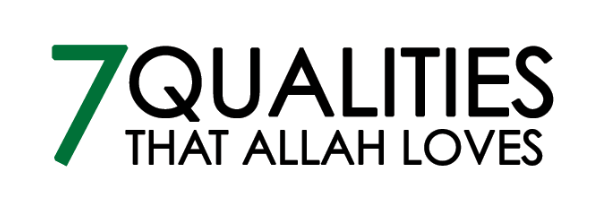
Posted in Daily Islam,EventsJuly 16, 2012No comments

The Supreme Court has called on all Muslims in the Kingdom of Saudi Arabia to sight the crescent of the blessed month of Ramadan on Thursday evening, Shaaban 29, 1433AH, corresponding to July 19, 2012, according to Umm Al-Qura Calendar.
In an announcement made this morning, the Supreme Court also called on whoever sees the crescent of the blessed month of Ramadan by naked eyes or through binoculars to report to the nearest court and register his testimony, or report to the authority of the region’s governorate if there is no judge in the area where he sighted the crescent in order to facilitate his reaching to the nearest court.
The Supreme Court also urges all Muslims to sight the Crescent for the cooperation of all Muslims in righteousness and piety.
Posted in Daily Islam,EventsJuly 16, 2012No comments

Posted in Daily Islam,Hadith,QuranJuly 16, 2012No comments
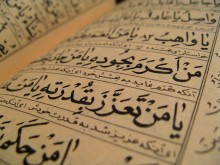
The person reciting the Qur’an must observe the proper etiquettes of recitation. Some of them are that: He make his intention sincerely for Allah, that he recite it whilst being in a state of purity, that he use the Siwaak and that he recite it while pondering on its meaning and observing total consciousness. Allah says:
“And We have indeed made the Qur’an easy to understand and remember, then is there any that will remember (or receive admonition)? ” (Qur’an, 54:17)
“Allah thus makes clear to you His communications [verses] that you may understand.” (2:242)
*From the above-mentioned verse of Qur’an it is clear that Allah told us to read the Quran with meaning.
Quran is a guide to humanity which also includes you. Since none of us want to be misguided, it is paramount not only to read or recite Quran, but to understand and implement it in our lives as well.
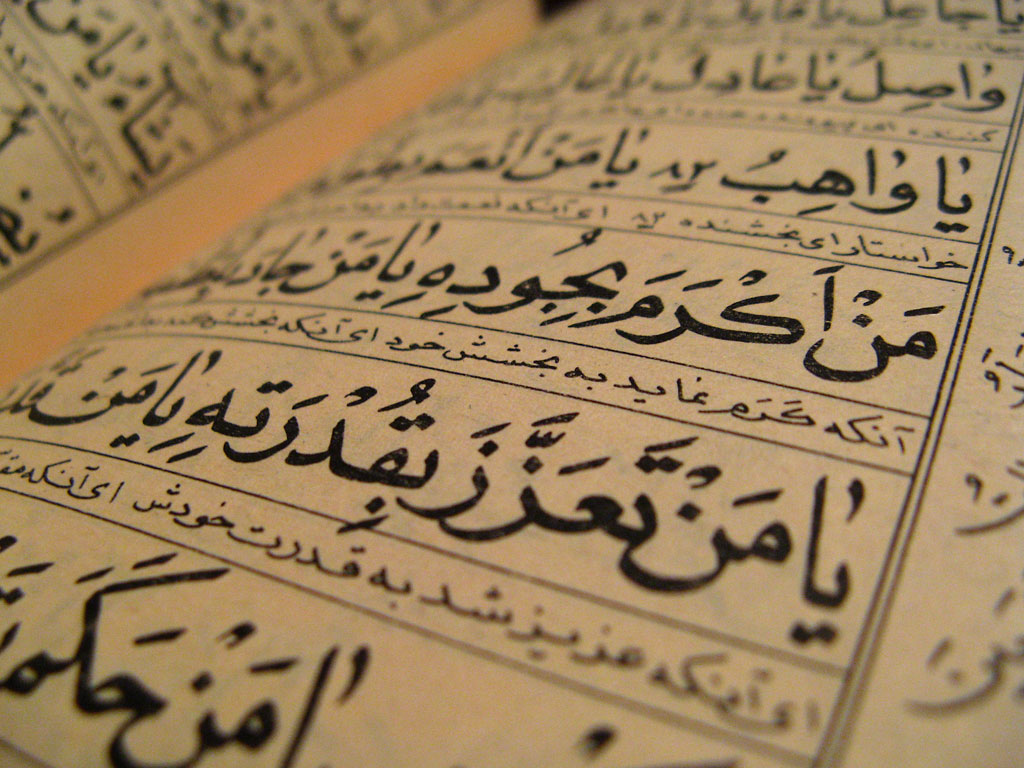
Prophet Muhammad (peace be upon him) gave us a simple formula to be the best: “The best amongst you is the one who learns the Qur’an and teaches it.” (Al-Bukhari) So go ahead, learn and teach the Qur’an, and make yourself among the best of Muslims Insha Allah.
Posted in Daily Islam,HadithJuly 12, 2012No comments
Our beloved Prophet SalAllahu Alyehe Wasallam said,
“A strong believer is better and is more lovable to Allah than a weak believer, and there is good in everyone, (but) cherish that which gives you benefit (in the Hereafter), and seek help from Allah and do not lose heart, and if anything (in the form of trouble) comes to you, don’t say: If I had not done that, it would not have happened so and so, but say: Allah did that what He had ordained to do; and your” if” opens the (gate) for the satan.”
[Sahih Muslim]
Posted in Daily Islam,EventsJuly 12, 2012No comments

 Since 2009, Project Ramadan has provided baskets of food to over 1,000 families across the Greater Toronto Area. Each basket contains all the basic ingredients needed to feed a family for a month. We’re aiming to make 2012 the biggest year yet, but we can’t do it without your help. For only $50 you can buy a basket that we will put together using our enthusiastic volunteers, and the Muslim Welfare Centre will help us deliver it into the hands of a Toronto family that could use a little help.
Since 2009, Project Ramadan has provided baskets of food to over 1,000 families across the Greater Toronto Area. Each basket contains all the basic ingredients needed to feed a family for a month. We’re aiming to make 2012 the biggest year yet, but we can’t do it without your help. For only $50 you can buy a basket that we will put together using our enthusiastic volunteers, and the Muslim Welfare Centre will help us deliver it into the hands of a Toronto family that could use a little help.
TO DONATE AND BUY BASKETS
Visit http://www.moveyourcommunity.com and click on DONATE NOW and select ‘Iftaar Dinner Baskets’ from the drop down menu
TO SPONSOR THE PROJECT
If you own your own small business or wholesaler, and would like to be a part of the Project Ramadan team, call us at 1-877-655-5523
TO VOLUNTEER WITH PROJECT RAMADAN
Interested in putting your time and energy into a good cause?
Email us at volunteer@moveyourcommunity.com
QUESTIONS?
Join the Facebook Group: Project Ramadan: Iftaar Baskets for the less fortunate in the GTA.
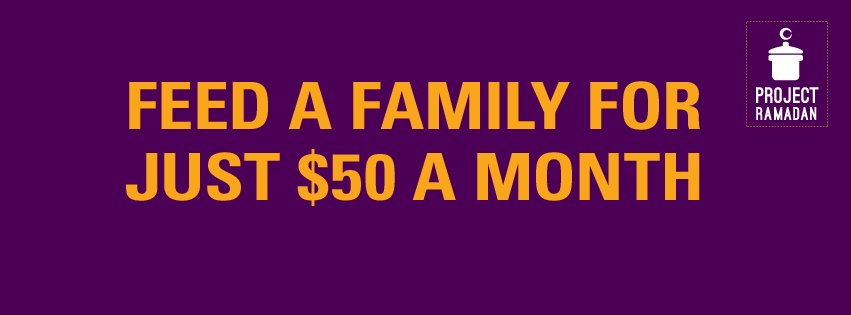
Posted in Daily Islam,QuranJuly 12, 2012No comments
49 This is a Message (of admonition): and verily, for the righteous, is a beautiful Place of (Final) Return,-
50 Gardens of Eternity, whose doors will (ever) be open to them;
51 Therein will they recline (at ease): Therein can they call (at pleasure) for fruit in abundance, and (delicious) drink;
52 And beside them will be chaste women restraining their glances, (companions) of equal age.
53 Such is the Promise made, to you for the Day of Account!
54 Truly such will be Our Bounty (to you); it will never fail;-
55 Yea, such! but – for the wrong-doers will be an evil place of (Final) Return!-
56 Hell!- they will burn therein, – an evil bed (indeed, to lie on)!-
57 Yea, such! – then shall they taste it,- a boiling fluid, and a fluid dark, murky, intensely cold!-
58 And other Penalties of a similar kind, to match them!
59 Here is a troop rushing headlong with you! No welcome for them! truly, they shall burn in the Fire!
60 (The followers shall cry to the misleaders:) “Nay, ye (too)! No welcome for you! It is ye who have brought this upon us! Now evil is (this) place to stay in!”
61 They will say: “Our Lord! whoever brought this upon us,- Add to him a double Penalty in the Fire!”
62 And they will say: “What has happened to us that we see not men whom we used to number among the bad ones?
63 “Did we treat them (as such) in ridicule, or have (our) eyes failed to perceive them?”
64 Truly that is just and fitting,- the mutual recriminations of the People of the Fire!
65 Say: “Truly am I a Warner: no god is there but the one Allah, Supreme and Irresistible,-
66 “The Lord of the heavens and the earth, and all between,- Exalted in Might, able to enforce His Will, forgiving again and again.”
67 Say: “That is a Message Supreme (above all),-
68 “From which ye do turn away!
69 “No knowledge have I of the Chiefs on high, when they discuss (matters) among themselves.
70 ‘Only this has been revealed to me: that I am to give warning plainly and publicly.”
71 Behold, thy Lord said to the angels: “I am about to create man from clay:
72 “When I have fashioned him (in due proportion) and breathed into him of My spirit, fall ye down in obeisance unto him.”
73 So the angels prostrated themselves, all of them together:
74 Not so Iblis: he was haughty, and became one of those who reject Faith.
75 ((Allah)) said: “O Iblis! What prevents thee from prostrating thyself to one whom I have created with my hands? Art thou haughty? Or art thou one of the high (and mighty) ones?”
76 (Iblis) said: “I am better than he: thou createdst me from fire, and him thou createdst from clay.”
77 ((Allah)) said: “Then get thee out from here: for thou art rejected, accursed.
78 “And My curse shall be on thee till the Day of Judgment.”
79 (Iblis) said: “O my Lord! Give me then respite till the Day the (dead) are raised.”
80 ((Allah)) said: “Respite then is granted thee-
81 “Till the Day of the Time Appointed.”
82 (Iblis) said: “Then, by Thy power, I will put them all in the wrong,-
83 “Except Thy Servants amongst them, sincere and purified (by Thy Grace).”
84 ((Allah)) said: “Then it is just and fitting- and I say what is just and fitting-
85 “That I will certainly fill Hell with thee and those that follow thee,- every one.”
86 Say: “No reward do I ask of you for this (Qur’an), nor am I a pretender.
87 “This is no less than a Message to (all) the Worlds.
88 “And ye shall certainly know the truth of it (all) after a while.”
Posted in Daily Islam,HadithJuly 11, 2012No comments
The Messenger of Allah (Allah bless him and give him peace) said: “When a person dies, his works end, except for three: ongoing charity, knowledge that is benefited from, and a righteous child who prays for him.” [Muslim, Tirmidhi]